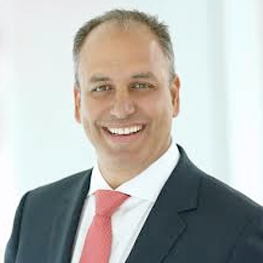Wael Barsoum was a successful surgeon with Cleveland Clinic, overseeing the Department of Orthopedics and innovating joint replacement techniques, when he began spotting areas for operational improvement at the Ohio hospital.
An admitted “problem solver,” Dr. Barsoum was applying predictive modeling to boost operating room efficiency, and reduce O.R. turnover times and patient length of stay following total joint replacement.
“That pretty quickly got some attention,” he recalls. Dr. Barsoum was named vice chair in the Department of Orthopedic Surgery, then Chairman of Surgical Operations across the entire hospital network. Then, he was appointed CEO of Cleveland Clinic Florida in Weston, Florida.
That was four years ago. Under his leadership, the Weston hospital was ranked first in Miami-Fort Lauderdale and a top hospital in Florida in 2018-19 by U.S. News & World Report. Dr. Barsoum today oversees a network of 11 Florida facilities; and with pending acquisitions will add an another 45 Florida facilities to his purview.
Although he wears the CEO’s suit, Dr. Barsoum remains an active surgeon and medical pioneer. He holds dozens of patents in the area of joint and replacement surgery, is involved in research studies, contributes to medical textbooks and co-authored more than 100 articles in peer-reviewed medical journals. He also serves as editor-in-chief of the Journal of Hip Surgery. Dr. Barsoum received the Cleveland Clinic Sones Award for Innovation in 2011 and the Cleveland Clinic Innovations Award 10 times.
In this interview with the Center for Leadership at Florida International University, Dr. Barsoum discusses the leadership challenges he faces as a practicing surgeon tasked with keeping the organization at the leading edge of innovation.
CFL: You went from physician to CEO, and now are both. Were you always a CEO in a lab coat?
WB: Business wasn’t infused in me at an early age. Medicine was. My father was a retired physician so I grew up with healthcare around me. One of the things that’s unique about Cleveland Clinic, unlike many organizations that will take physicians and put them in leadership roles with very little training, we have really put together some spectacular leadership training programs for physicians interested in playing an administrative role. So, whether it’s about finance, operations, strategy, quality, or patient experience, we try to make sure people have the tools to be successful leaders in those roles. Simply having your medical degree doesn’t make you a subject matter expert in all things medical. So having that training makes a big difference.
CFL: What edge does the pursuit of institutional innovation and creativity give an organization such as yours?
WB: The reality is most hospitals perform at a very high level when it comes to safety, patient experience, and quality. So one of the opportunities to differentiate yourself is innovation. What are you doing that is different, that sets you apart? If you look at our hospital, we were one of the first in the world to do coronary angiography, first in the world to do successful coronary artery bypass surgery, first in the world to have a functioning artificial kidney, and first to design and study patient specific instrumentation in hip and shoulder replacement. These innovations have allowed our departments to differentiate ourselves from our peers. That, I think, is the advantage and benefit you get in being a center of innovation.
CFL: How do you infuse a spirit of innovation across the leadership ranks?
WB: It’s a combination of selection and being in an environment that values innovation. First, there is a little selection bias. Innovative, out-of-the-box thinkers at Cleveland Clinic have that opportunity to lead. Second, there is clear motivation for folks to innovate because they are surrounded by brilliant, hardworking, hard charging people who are constantly trying to do better. You end up pushing yourself to be better. So, a lot of leadership success comes through hard work, and a lot of it is about innovation and thinking about how to set up processes and systems that allow us to work better.
CFL: How do you encourage collaborative leadership?
WB: We constantly have leadership opportunities to train the next generation of leaders, ways for leaders to get together to collaborate on strategy, operations and opportunities for improved efficiencies. Cleveland Clinic is a very unique place, and we have projects at work at every level of the organization to improve operations. You can walk on any of our nursing floors and you will find Kaizen boards that are looking at continuous improvement of processes and innovating our delivery model to make it better and more efficient and to take out cost. It is ingrained in our organization at every level.
CFL: You regularly attend leadership courses and keep up to date on management best practices. How does leadership education help you, inspire you, and help others coming through the ranks?
WB: The whole idea of leadership training is a science. There is both a kind of the innate ability for somebody to lead, and there is also the opportunity to learn how to be a better leader. The two things go hand in hand to a large degree: how you build education around leadership; how you organize your thoughts; how you operationalize your plans; how you set goals and objectives; how you give feedback and build a team. You can’t reinvent the wheel every time you start a project or initiative, so there’s clear science that great leaders understand and evolve for their own leadership style.
CFL: How do you maximize your leadership training so it resonates more deeply and affects your own future leader?
WB: The first thing to do is take an inventory of what your personal skills are and what your interests are, then identify what your gaps are, and then make a truly concerted effort to fill those gaps. I personally tend to be a more strategic, high-level thinker. So when I try to build a team or improve my own skill set, it’s not only around the high-level strategic thinking, but it’s trying to fill my gap. That could mean creating the advance chart or the Excel spreadsheet that has all the steps that needed to make sure your process mapping is complete. That doesn’t necessarily come terribly naturally to me, so it’s something I’ve had to work on to become a better leader.
CFL: Is there specific leadership advice that has stuck with you throughout your career?
WB: Our Chief Operating Officer for Florida, who is just a spectacular guy – and one of the hardest working people I know – gave me a piece of advice that his father gave him:“You might not be the smartest, or quickest person in the room, but what you can make sure is that you’re the hardest working person in the room.” I think it comes down to, you may have all the talent in the room to be a great leader, and that’s terrific; but every great leader who makes a meaningful difference works hard. I think there is no substitute for rolling up your sleeves, working hard, and leading by example.
Even in my family, we have a saying, “Wake up, say a prayer, and go hustle.” I have three young kids and we talk about that all the time. Wake up, be grateful for what you have, then go work.
CFL: How do you champion leadership and encourage your direct reports and other leaders to promote, encourage, or reward leadership among their charges?
WB: We do it a few ways: We recognize people who do great things; that’s important. And if they’re comfortable, do it publicly and make it known that they’ve done something special. We don’t let leadership planning be a reactive event; it’s a proactive event. We have frequent talent reviews; we evaluate our doctors, our nurses, our techs. We have succession plans in place so that we know who the next generation of leaders are; and we train them to be prepared to step into a role, either in a logical way, or sometimes in unexpectedly if someone leaves and a position opens up. So be proactive about your leadership planning and your leadership training; and as an organization, be thoughtful about where your gaps are and train people to fill those gaps. We recognize that every great organization still has areas they can be better in.
CFL: What three tips would you have for current or aspirational leaders?
WB: First, build a great team around you, and let them do their jobs. Second, be honest with yourself about what your weaknesses are and work to strengthen them. And third, be the hardest working person in the room.
CFL: Complete this sentence. Effective leadership is...
WB: Effective leadership is... identifying and empowering talent.
About The Center
The award-winning FIU Center for Leadership explores leadership thought and practice through continuous research; assists in the development of keen self-insight; teaches leadership competencies through open enrollment and custom, company-specific leadership courses; and offers seminars and other programs. The Center helps corporate partners and executives meaningfully transform their organizations and their societies by equipping better leaders for a better world.
Ready to champion your leadership?
Join us for The Leadership Accelerator Program. This 2-day leadership program takes place January 31 and February 1, 2019 and is designed for managers with 2-10 years of experience. Well-qualified participants are responsible for leading a team of individual contributors. Job titles may include assistant/associate directors, senior managers, project managers, or managers.


